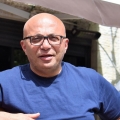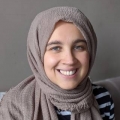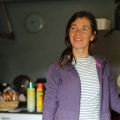Next Generation Panel
Filmlab Palestine has been focusing on the neglected needs of children and young people in Arab cinema since 2014. Through its Next Generation program, Filmlab promotes visual literacy for children and seeks to bring the subject to the forefront of the regional film scene. With its local film literacy curriculum for children and the cutting-edge development and production program Sunbird Stories program, Filmlab has created a coherent system that represents the first steps towards promising development.In the tradition of this approach, this year's panel of the Next Generation program invites scholars, filmmakers, and educational practitioners to discuss children's visual literacy from present day perspectives.
More than any other time, image-making in the age of high technology is challenged by the forces of the capitalist marketplace, which redefine the means of human interaction and its functions. In particular, children are exposed to the mechanisms of this market through the daily use of social media. What possibilities does the film industry have to respond to this development? How can it support a critical consciousness? In this panel discussion, we look at the potential and possible tools of the film industry and discuss ideas to respond to the challenge that Palestinian children and youth are exposed to in the age of high technology.
Participants
Wasim al Kurdi
Poet, researcher, author, educational development expert specializing in ‘Drama in Education’. He has an MA in Drama and Education from Birmingham University. He worked as an Arabic and creative writing teacher in Ramallah Friends School, and then as researcher and director of Educational Research and Development in A.M. Qattan Foundation in Palestine (2000 – 2020). He currently works on developing professional capacity building programs for teachers, focusing on utilizing drama as a medium for education and applying science and art in integrated education. He founded Ru’a educational magazine and worked as its managing editor for 20 years. He published four poetry collections and translated several children’s books. He also wrote lyrical performances for Al Funoun Dance Troupe, Edward Said Conservatory of Music, Sarriyet Ramallah, Washm Group and the Popular Theatre.
Feryal Awan
Dr Feryal Awan is a Lecturer in Interdisciplinary Race, Gender and Postcolonial Studies at UCL. Her research interest lies at the intersection of politics and international relations; media studies; and critical childhood studies.
Feryal’s work examines the political, cultural and socioeconomic impact of colonialism on children in Palestine and the UK. Her PhD, funded by the Arts and Humanities Research Council, is an ethnographic study looking at the discourses and politics of childhood and their place in screen content available to Palestinian children. She also contributed to an AHRC project, which explored digital opportunities to expand literacy to out of school and refugee children in the Arab world.
Lucie Lambert
Lucie Lambert spent her childhood on Québec’s North Shore, in-between forest and sea. Following her studies in litterature, she developed a passion for a free-form genre of filmmaking. Her favourite themes, whether in Landscape in the Mind’s Eye, Before Daybreak, Gracile’s Father or in her most recent work, touch on the relationships between women, men and children and the territory they inhabit.
Dr. Areej Mawasi
Dr. Areej Mawasi is a lecturer, researcher, and writer in learning sciences, educational technology, and design. She focuses on the study and design of learning environments mediated by technology to support learners' collaborative and interactive engagement. Dr. Mawasi earned her PhD and master’s from Arizona State University, where she worked at Center for Science and the Imagination. She was a postdoc research associate at University of Colorado Boulder, to study and design a curriculum about sociocultural and political aspects of artificial intelligence. Dr. Mawasi interdisciplinary work is published in venues on learning sciences and education, technology and digital media in society, and ethics.



